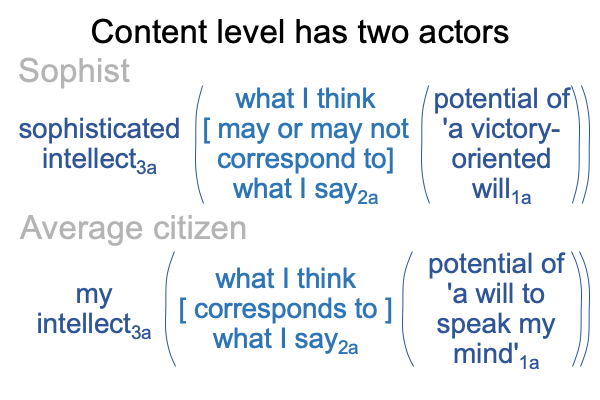0807 After this rollout on the abuse of language, I return to the virtual nested form in the category of firstness.

0808 I summarize.
The will1a to speak my mind2a addresses the two-fold purpose to spoken words and language.
First, spoken words should picture or point to their referents. In this, they do not. But, they do the next best thing. Spoken words convey reality. Reality is one perfection of spoken words.
Second, spoken words intend to establish a common understanding. What is understanding? Understanding is a complete nested form, where a normal context3 brings an actuality2 into relation with its potential1. Spoken words2 need to do that. That need is satisfied for a spoken word when a definition3 brings that spoken word2 into relation with the potential of meaning, presence and message1.
0809 In the normal context of rhetorical discourse3b, sophists formally package understanding1b according to variations of the above formula. Definition3 brings a spoken word2 into relation with the potentials of what I think (meaning)1, what I say (message)1, and the intellect1, as that which characterizes whether one particular word is used or not.
0810 What about the will1a?
Well, the only reason why the sophist3b situates the citizen3a,1a through rhetorical discourse3b is to be victorious1a.
Oops. I should not have mentioned that.
0811 Instead, let me say that the sophist3b frames each proposition1b in order to articulate sophisticated values2b (the citizen3a,1a is obviously incapable of doing this, since he is merely saying what he thinks2a). This requires that the understanding that the citizen expresses2a be repackaged into well-defined propositions1b in such a manner that the ongoing discourse3b reveals the reality that the sophist wants the citizen to endorse.
0812 Finally, the packaging of knowledge1b, the sophistication of the argument2b and the reality of the discourse itself3bflatter1c the one who pays the sophist3c and provides the opportunity1c for a decision2c that will provide well-deserved remuneration.
I suspect that the last sentence may be regarded as offensive by the one who pays3c. No one is supposed to talk about the one who pays the sophist from the riches that he earns from political manipulation of public decisions.
Plus, sophists3b are not really redefining the meaning, message and presence underlying spoken words. They are “adjusting” them to suite their needs. Yes, particular situations call for particular adjustments. Finally, the victorious will1a does not opportunistically say what is necessary to win1a. The intellect3a with the he victorious will1a only stateswhat furthers a rhetorical position1a.
0813 Now, the reason why Plato despises the sophists becomes a little more transparent.
Their abuse of words leads to the corruption of language.
After all, the two functions of spoken words are to convey reality and to achieve understanding.
Neither is furthered by the virtual nested form pictured above.
0814 The sophist is not concerned about the truth. The truth should resonate with my will1a, but it does not, because there are two wills in play on the content level, the will of the citizen1a and the will of the victory-oriented sophist1a. The same can be said for the intellect3a.
0686 Here is a picture.

0815 Indeed, in regards to the content-level normal context, my intellect3a confronts a sophisticated intellect3a in the arena that serves as a forum for citizens making decisions3b.
0816 Is this an abusive relationship?
What chance does the citizen have? When the citizen speaks, he says what is on his mind. He speaks what he is thinking. When his opponent speaks, he says what is necessary to achieve victory.
